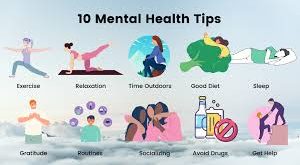A physical check-up is a comprehensive health examination performed by a healthcare professional to assess your overall health and detect potential medical conditions. While many people only visit the doctor when they’re feeling unwell, regular physical check-ups are an essential part of maintaining long-term health. These check-ups can help catch potential health issues early, ensure that you’re living a healthy lifestyle, and provide peace of mind.
But how do you know when it’s time to schedule a full physical check-up? Sometimes, subtle signs or changes in your health might indicate the need for a more thorough evaluation. Here are 10 signs that you might need a full physical check-up.
1. Unexplained Fatigue
Feeling tired from time to time is normal, especially if you’ve had a long day, week, or stressful period in your life. However, chronic fatigue—feeling persistently tired even after adequate rest—could be a sign of an underlying health condition. Conditions such as thyroid disorders, sleep apnea, anemia, depression, or even heart disease can manifest through extreme fatigue.
What to Do:
If you’ve been feeling excessively tired for weeks or even months, it’s time to consult a healthcare provider. A full physical check-up can help identify the root cause of your fatigue and offer solutions.
2. Sudden Weight Loss or Gain
If you’ve experienced significant weight loss or gain without making any changes to your diet or exercise routine, it could indicate an underlying issue. Unexplained weight fluctuations can be a symptom of various health conditions, including thyroid problems, diabetes, stress, digestive issues, or even some forms of cancer.
What to Do:
If your weight changes drastically without an obvious cause, schedule a check-up to investigate the potential underlying cause. A physical check-up will likely include blood tests to check for metabolic, hormonal, or nutritional imbalances.
3. Persistent Pain or Discomfort
Persistent pain in your body—whether it’s in your back, joints, head, or muscles—should never be ignored. While occasional aches are normal, long-term pain can be a sign of a chronic condition such as arthritis, fibromyalgia, or nerve damage. It could also indicate more serious issues like heart disease, particularly if the pain is in the chest or radiates to your left arm.
What to Do:
If your pain persists for weeks or worsens, it’s important to get checked by a doctor. A physical exam can help pinpoint the cause of the pain, and additional tests like X-rays or MRIs may be recommended to further assess the issue.
4. Shortness of Breath or Difficulty Breathing
If you find yourself experiencing shortness of breath or difficulty breathing, it could be a sign of a respiratory or cardiovascular issue. Asthma, COPD (chronic obstructive pulmonary disease), pneumonia, or heart conditions such as heart failure can cause difficulty breathing. In some cases, it may indicate a severe condition like a blood clot or an infection.
What to Do:
If shortness of breath is sudden or persistent, or if it occurs alongside chest pain or dizziness, it’s essential to seek medical attention right away. A physical check-up will assess lung function and heart health to identify the cause of the symptoms.
5. High Blood Pressure Readings
High blood pressure (hypertension) is known as the “silent killer” because it often shows no symptoms but can lead to serious conditions like stroke, heart attack, and kidney disease. If you’ve been experiencing headaches, dizziness, or blurry vision, or if you’re just unsure about your blood pressure levels, it might be time for a check-up.
What to Do:
Regular monitoring of blood pressure is important, especially for individuals who have a family history of hypertension or heart disease. If you have concerns, a check-up will provide a blood pressure screening and help manage your heart health.
6. Digestive Problems
Chronic digestive issues such as persistent heartburn, bloating, constipation, or abdominal pain should not be dismissed. Conditions like irritable bowel syndrome (IBS), celiac disease, or acid reflux can disrupt your daily life. In some cases, digestive symptoms could be linked to more serious conditions like colorectal cancer.
What to Do:
If digestive symptoms persist or worsen over time, it’s time to see a healthcare professional. A full check-up will typically include a physical exam and may involve tests such as blood work, stool tests, or even endoscopy to evaluate your digestive health.
7. Skin Changes or Growths
Any new skin growths, moles, or changes in the appearance of existing ones should be evaluated by a doctor. Changes in skin texture, color, or shape can indicate skin conditions such as eczema, infections, or even skin cancer. Early detection is crucial for skin cancer, so it’s important to pay attention to any unusual changes in your skin.
What to Do:
If you notice new moles or growths, or if an existing mole changes shape, size, or color, schedule a check-up with your doctor. A dermatologist can examine your skin and may perform a biopsy if necessary.
8. Mental Health Struggles
Mental health is just as important as physical health. If you’ve been feeling overwhelmed, anxious, depressed, or have noticed changes in your mood, energy levels, or sleep patterns, it may indicate an underlying mental health condition such as anxiety or depression. These conditions are treatable with proper care and support.
What to Do:
If these feelings are persistent and impact your daily life, seeking professional help is important. A full physical check-up can also assess underlying medical causes (such as hormonal imbalances or sleep disorders) that may contribute to mental health challenges.
9. Poor Sleep Quality
Quality sleep is vital for overall health, but many people experience sleep disturbances such as insomnia, waking up frequently, or feeling unrested despite spending hours in bed. Poor sleep can be linked to sleep apnea, depression, anxiety, or other health issues like hormone imbalances or nutritional deficiencies.
What to Do:
If you regularly have trouble sleeping or wake up feeling fatigued despite getting adequate hours of rest, it may be time for a check-up. Your doctor may recommend sleep studies or other tests to determine the cause of your sleep issues.
10. Frequent Headaches or Migraines
Occasional headaches are common, but if you experience frequent headaches or migraines that disrupt your daily routine, it could be a sign of a more significant issue, such as hormonal imbalances, dehydration, high blood pressure, or neurological conditions. Migraines, in particular, may indicate an underlying condition that requires treatment or lifestyle adjustments.
What to Do:
If your headaches are recurring and worsen over time, it’s essential to get a check-up. A physical exam and possibly imaging tests (like an MRI or CT scan) can help rule out more serious conditions and provide guidance on treatment.
Conclusion: Stay Proactive About Your Health
While it’s easy to ignore minor symptoms or assume they’ll go away on their own, taking a proactive approach to your health can prevent more serious conditions down the road. If you experience any of the 10 signs mentioned above, it may be time for a full physical check-up.
A regular check-up provides an opportunity to detect potential health issues early, address concerns before they become more serious, and ensure that your overall health is on track. Even if you feel healthy, it’s always a good idea to have a healthcare provider evaluate your health regularly.
Consult your doctor if any of the signs mentioned in this article are affecting your well-being, and make sure to schedule your regular check-ups. Taking care of your health is an investment in your future, and your body will thank you for it!


